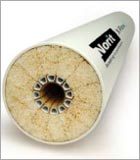Ultrafiltration Membranes
Product Details:
Product Description
8" Aqua Flex HP PVC 0.8MM
Article Code: 23E1FL295H
Elecment Specifications
| Module Type | Membrane Diameter (mm/mil) | Membrane area (m2/ft2) | Feed connection Do(*) | Module Length L0 (mm/Inch) | Permeate connection D0 (mm/Inch) |
| Aquaflex HP | 0.8 (31) | 55 (590) | 220.0 (8.66) | 1537.5 (60.51) | 42.6 (1.68) |
Weight Specifications
- Dry weight of membrane element: ca. 34 kg [75 lbs]
- Membrane element filled with water: ca. 66 kg [145 lbs]
- Housing: PVCw
- Flow distributor: PVC/PP
- Potting: PU resin
- Membrane: PES/PVP
- Hydrophilic membrane composed of a blend of polyvinylpyrrolidone and polyethersulfone (patented)
- structure asymmetric/microporous
- Developed for inside-out filtration
- High performance and a very good anti-fouling behaviour
- Typical permeate quality SDI<3, turbidity <0,1 NTU
Cleaning Chemical Resistance
| Sodium Hypochlorite | Chlorine Dioxide | Hydrogen Peroxide | Ozone |
| Typical 200 ppm, 40 oC or lower at pH 10 or higher | Typical 1 ppm, at 40 oC or lower | Typical 200 ppm, at 40 oC or lower | Typical 0.5-5 ppm, at 40 oC or lower |
| Maximum 500 ppm | Maximum 2 ppm | Maximum 500 ppm | Maximum 20 ppm |
| 250.000 ppm hours cumulative; pH=11 | 90.000 ppm hours cumulative; pH=11 | 350.000 ppm hours cumulative | 150.000 ppm hours cumulative |
Note
The above figures for oxidant contact represent the membrane resistance to each individual oxidizing agent. The total combined exposure for Sodium Hypochlorite and Chlorine Dioxide will be calculated as follows
Combined exposure (NaOCl+ClO2)=2.6xExposure to ClO2 (in ppm hours)+Exposure to NaOCl (in ppm hours)<250.000 ppm hours.
As a good working practice and in order to maximise the lifetime of the membrane it is advised to reduce the membrane exposure to oxidising agents to a minimum. Exposure limits are also affected by temperature , pH and the presence of metals. In order not to exceed maximum exposure limits, membranes must be
preserved free of any oxidising agent when the plant is stopped.
| Acids | | Bases | |
| Hydrochloric Acid | ++ | Sodium Hydroxide (<4%) | ++ |
| Nitric Acid | ++ | Potassium Hydroxide (<4%) | ++ |
| Phosphoric Acid | ++ | | |
| Acetic Acid | ++ | | |
| Citric Acid | ++ | | |
| pH>2 During filtration | | pH<12 During filtration | |
| pH> 1 During cleaning | | PH<13 During cleaning | |
| Module Type | Hydraulic Membrane Diameter (mm/mil) | Cross-flow flow rate(*) | Pressure-Drop across module at 1 m/s (kPa/psi) | Pressure-drop across module at 2 m/s (kPa/psi) |
| Aquaflex HP | 0.8 (43) | 27.5xv (37xv) | 72 (10) | 150 (21) |
(*) Superificial Velocity (v) in m/s (ft/s).
Operating Specifications
| Maximum system pressure | Maximum transmembrane pressure (kPa/psi) | Maximum backflush pressure (kPa/psi) | Operating temperature range (oC/oF) |
| 500 (72) | 300 (43) | 300 (43) | 0-40 (32-104) |
- Backwash water should be free of particulates and should be of permeate quality or better.
- Backwash pumps should preferably be made of non-corroding materials, e.g., plastic or stainless steel. If compressed air is used to pressurize the backwash water, do not allow a two-phase air/water mixture to enter the element.
- To avoid mechanical damage, do not subject the membrane module or element to sudden temperature changes, particularly decreasings. Bring the module or element back to ambient operating temperat
Operation of membrane modules at any combination of maximum limits of pH, concentration, pressure or temperature, during cleaning or production, will influence the membrane lifetime.
|
|
|
 |
ZEN MARKETING LIMITED
All Rights Reserved.(Terms of Use) Developed and Managed by Infocom Network Private Limited. |




